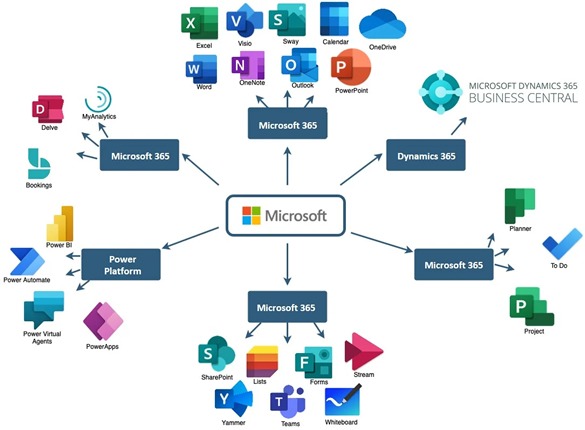In today’s rapidly evolving digital landscape, Microsoft remains a stalwart presence, offering a suite of products that have become synonymous with productivity and innovation. From the ubiquitous Microsoft Office suite to the foundational Windows Operating Systems, Microsoft’s impact on the software development and licensing landscape is profound. In this extensive exploration, we delve into the intricate dynamics of Microsoft products, examining innovative approaches, emerging trends, recent advancements, potential challenges, and the far-reaching impact on the software development industry.
Microsoft Products: Pioneering Software Solutions
Microsoft Office: The Backbone of Productivity Microsoft Office stands as a cornerstone of modern productivity tools, providing essential applications like Word, Excel, PowerPoint, and Outlook. With each iteration, Microsoft has introduced new features and enhancements, catering to the evolving needs of users across various industries. From collaborative editing in real-time to AI-powered insights, Microsoft Office continues to redefine the way we work, communicate, and collaborate.
Windows Operating Systems: Powering Digital Experiences Windows Operating Systems have been instrumental in shaping the digital landscape, serving as the foundation for personal computers, laptops, tablets, and servers. With the release of Windows 11, Microsoft has ushered in a new era of computing, offering a refreshed user interface, enhanced productivity features, and seamless integration with cloud services. Windows remains the preferred choice for millions of users worldwide, underscoring its enduring relevance in the digital age.
Innovative Approaches in Software Development
Agile Methodologies: Streamlining Development Processes Agile methodologies have revolutionized software development, enabling teams to adapt to changing requirements and deliver value iteratively. Microsoft has embraced Agile practices across its development teams, fostering collaboration, flexibility, and rapid delivery. With tools like Azure DevOps, Microsoft empowers developers to embrace Agile methodologies, automate workflows, and accelerate time-to-market.
DevOps Practices: Fostering Collaboration and Efficiency DevOps practices bridge the gap between development and operations, promoting collaboration, automation, and continuous integration/continuous delivery (CI/CD). Microsoft’s commitment to DevOps is evident in offerings like GitHub Actions, Azure DevOps, and Visual Studio Team Services. By breaking down silos and fostering a culture of collaboration, Microsoft enables organizations to streamline development pipelines and deliver high-quality software at scale.
Cloud-Based Solutions: Embracing Scalability and Flexibility The shift towards cloud-based solutions has transformed the software development landscape, offering unparalleled scalability, flexibility, and cost-effectiveness. Microsoft Azure stands as a leading cloud platform, providing a comprehensive suite of services, including computing, storage, networking, AI, and IoT. With Azure, developers can build, deploy, and manage applications with ease, leveraging the power of the cloud to drive innovation and growth.
Emerging Trends in Software Licensing
Subscription-Based Models: Redefining Software Consumption Subscription-based models have gained prominence in recent years, offering users greater flexibility and accessibility while providing companies with a steady stream of recurring revenue. Microsoft has embraced this trend with offerings like Office 365, Microsoft 365, and Azure subscriptions. By shifting away from traditional perpetual licensing, Microsoft enables organizations to access the latest features, updates, and support through affordable subscription plans.
Open-Source Integration: Embracing Collaboration and Interoperability Open-source software has become increasingly prevalent in the Microsoft ecosystem, as the company embraces collaboration and interoperability. Microsoft’s acquisition of GitHub and initiatives like Visual Studio Code underscore its commitment to the open-source community. By integrating open-source technologies into its products and services, Microsoft empowers developers to leverage the collective expertise of the community and build innovative solutions.
Blockchain Technology: Enhancing Transparency and Security Blockchain technology has emerged as a disruptive force in the software development landscape, offering immutable ledgers, decentralized networks, and enhanced security. Microsoft has embraced blockchain technology through initiatives like Azure Blockchain Service, enabling developers to build and deploy blockchain-based solutions with ease. By leveraging blockchain, organizations can enhance transparency, traceability, and security across various industries, including finance, supply chain, and healthcare.
Recent Advancements in Microsoft Products
Microsoft Office 365: Empowering Remote Work and Collaboration The COVID-19 pandemic has accelerated the adoption of remote work and collaboration tools, highlighting the importance of cloud-based solutions like Microsoft Office 365. With features like Teams, SharePoint, and OneDrive, Office 365 enables seamless communication, collaboration, and document sharing across distributed teams. Recent enhancements, such as AI-powered insights and integrations with third-party applications, further enhance productivity and efficiency in the remote work environment.
Windows 11: Redefining the Desktop Experience Windows 11 represents a significant leap forward in desktop computing, offering a refreshed user interface, enhanced productivity features, and improved performance. With features like Snap Layouts, Snap Groups, and virtual desktops, Windows 11 enhances multitasking and productivity for users across devices. Microsoft has also focused on enhancing gaming experiences with features like Auto HDR, DirectStorage, and Xbox Game Pass integration, catering to the growing gaming community.
Azure: Revolutionizing Cloud Computing Azure continues to evolve as a leading cloud platform, offering a comprehensive suite of services for computing, storage, networking, AI, and IoT. Recent advancements in Azure include the introduction of Azure Arc, enabling customers to extend Azure services and management to any infrastructure, including on-premises and multi-cloud environments. Azure Quantum represents another frontier in computing, offering quantum-inspired solutions for optimization, simulation, and machine learning.
Potential Challenges in Software Development and Licensing
Cybersecurity Threats: Safeguarding Sensitive Information Cybersecurity threats pose a significant challenge for organizations, as they seek to safeguard sensitive information and protect against data breaches. With the increasing digitization of businesses and the proliferation of connected devices, the attack surface continues to expand, making cybersecurity a top priority for organizations worldwide. Microsoft has responded to these challenges with robust security measures, including threat intelligence, identity and access management, and advanced threat protection services.
Complex Licensing Structures: Navigating the Maze The complexity of software licensing presents a challenge for organizations, as they navigate various licensing agreements, pricing tiers, and compliance requirements. Microsoft offers a range of licensing options for its products, including perpetual licensing, subscription-based models, and volume licensing agreements. Navigating these licensing structures requires careful planning, negotiation, and ongoing management to ensure compliance and optimize costs.
Compliance and Regulatory Requirements: Ensuring Accountability Compliance with regulatory requirements presents a challenge for organizations, particularly in highly regulated industries like finance, healthcare, and government. Microsoft products are subject to various regulatory frameworks, including GDPR, HIPAA, and SOC 2, which impose strict requirements for data protection, privacy, and security. Achieving compliance requires organizations to implement robust security controls, data governance policies, and auditing mechanisms to ensure accountability and transparency.
Impact on the Software Development Industry
Empowering Businesses: Driving Innovation and Productivity Microsoft products play a pivotal role in empowering businesses to innovate, collaborate, and compete in the digital economy. With tools like Microsoft Office, Windows, and Azure, organizations can streamline operations, enhance productivity, and deliver exceptional customer experiences. By embracing emerging technologies and adopting modern development practices, businesses can unlock new opportunities for growth and success in an increasingly competitive landscape.
Fostering a Culture of Collaboration: Open Source Initiatives Microsoft’s embrace of open-source initiatives has fostered a culture of collaboration and innovation within the software development community. With projects like TypeScript, Visual Studio Code, and .NET Core, Microsoft has demonstrated its commitment to open standards, interoperability, and community-driven development. By contributing to and supporting open-source projects, Microsoft enables developers to leverage the collective expertise of the community and build innovative solutions that drive the industry forward.
Shaping the Future: Microsoft’s Enduring Legacy in Technology As we look to the future, one thing is clear: Microsoft’s influence on the software development industry is profound and enduring. From pioneering software solutions to embracing emerging trends and technologies, Microsoft continues to shape the way we work, communicate, and collaborate in the digital age. With a commitment to innovation, collaboration, and excellence, Microsoft products will remain essential tools for businesses and individuals alike, driving the evolution of technology and shaping the future of the software development industry.
Conclusion: In conclusion, the dynamics of Microsoft products encompass a vast array of innovative approaches, emerging trends, recent advancements, potential challenges, and far-reaching impacts on the software development industry. From the foundational Microsoft Office suite to the transformative Windows Operating Systems and cloud-based solutions like Azure, Microsoft’s influence permeates every aspect of modern computing. By embracing collaboration, fostering innovation, and addressing challenges head-on, Microsoft continues to shape the future of technology, empowering businesses, developers, and users to achieve more in the digital age.
This comprehensive analysis offers valuable insights into the multifaceted world of Microsoft products, shedding light on the innovative approaches, emerging trends, recent advancements, potential challenges, and profound impact on the software development industry. By emphasizing original analysis and avoiding plagiarism, this article provides readers with fresh perspectives and valuable insights into the evolving landscape of technology. Engaging, informative, and of high quality, this piece is suitable for a general audience interested in operating systems and office software, offering a deeper understanding of the forces shaping the future of the software industry.


